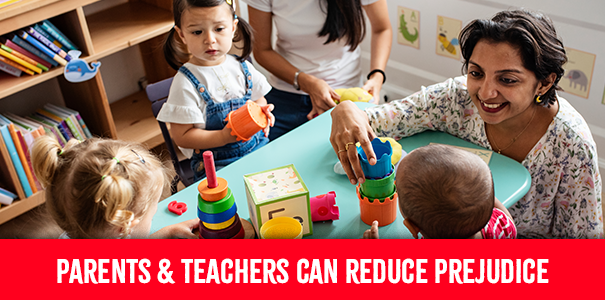Parents, teachers and schools play a critical role in reducing prejudice
Professor Fiona White, leading expert from the new documentary The School That Tried to End Racism (ABC Education TV), writes: “parents and teachers play a critical role in working together to reduce prejudice and racism before they become so deeply entrenched in children that they are impossible to shift”.
Racism is learned behaviour and it’s no secret that children are quick to pick up on behavioural cues. Educating children and young people about racism empowers them to take action and be part of the solution.
Prejudice involves negative beliefs, feelings or intentions towards others just because of the particular cultural, ethnic or religious group they belong to.
Prejudice has been shown to emerge in children as young as 3 years of age and continue throughout their lives, and it can influence who they make friends with, who they exclude and who they name-call.
Fortunately, what has been learned can also be unlearned.
This is why education is the most important tool we have in the fight against racism and prejudice.
One major step to teaching children about inclusion is for them to have a diverse group of friends.
Having a cultural mix of friends exposes children to a diverse set of practices and perspectives, and with time, they learn to appreciate that these differences are not harmful, but instead that these diverse ways of thinking can all make an equally valid contribution to our social fabric.
The unique and close emotional bonds that friendships create make prejudgements and stereotyping of their mates less likely.
Parents are the primary role models for socialising their children
Children are constantly watching, scrutinising and internalising their parents’ thoughts and behaviours, including those related to prejudice and racism.
Subsequently, parents need to self-reflect on how much cultural diversity and connection exist among their family friendship groups, and whether their children are aware of, or a part of, such groups.
Teachers can encourage cross-group interactions in the classroom
Teachers can encourage cross-group student interactions by, for example, having culturally diverse students work together to complete group projects.
Achieving a common goal together in the classroom can break down the boundaries of “us versus them”, to reorganise student thinking along the lines “we”.
The ABC Education documentary, The School That Tried To End Racism, explores a ground-breaking school program designed to provide a class of primary school students with the tools to identify racial bias and make positive change. This is freely available on iView.
The content of school curricula can also be easily modified:
- Maths and science teachers can integrate culturally diverse protagonists into their problem-solving scenarios.
- History teachers can provide both pre-colonial and colonial perspectives on Australia’s origins.
- English teachers can select novels that involve multicultural characters and themes.
- Music and art teachers can select instruments and design techniques used and adopted by a diverse range of cultures.
There are also many educational resources available:
- No Way!
- It Stops With Me
- Schools Standing Up To Racism
- All Together Now
- Reconciliation Australia
- Challenging Racism Project
- Anti-racism education
- Racist Bullying
- Remove Hate From The Debate
- Challenge Prejudice and Bust Stereotypes
Professor White notes that: “if we are ever to address this cultural pandemic — and live in the respectful and inclusive society we all desire — early interventions involving children is the best option moving forwards. Practical strategies to promote the quantity and quality of children’s cross-group friendships can act as a social vaccine against the cultural pandemic of prejudice and racism into the future.”
The IEU has a broad cultural membership. If you require support at anytime, please contact us on 8410 0122 or email – enquiries@ieusa.org.au
Sources
https://iview.abc.net.au/show/school-that-tried-to-end-racism


